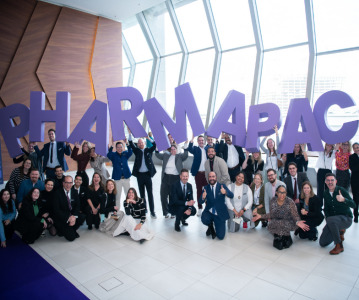Sourcing Responsibly – putting ESG principles into practice: Connect to Frankfurt on-demand
.png)
In this Connect to Frankfurt session, Enric Bosch, Global Third Party manager, Chemicals at Boehringer Ingelheim (Barcelona, Spain), investigates the growing shift towards environmental, social, and governance (ESG) principles and how to put responsible sourcing for pharmaceutical companies into practice.
As part of our conference track on Sustainability, this session covers the ethical and sustainable considerations impacting the pharmaceutical supply chain, and the responsibility of all key players to make a positive impact not only for their stakeholders but for a collective global benefit.
Responsible procurement
The goal of responsible procurement is to improve the ethical, environmental, and social performance of suppliers and ultimately mitigate any negative impacts found within the supply chain. Responsible procurement looks at not only where or what to source, but how to source according to ESG criteria, sustainability criteria, and more. Such focus on sustainability can not only minimise the risk of disruption in the supply chain, but also mitigate any reputational damage for a given company.
While Bosch acknowledges the increased complexity for decision-makers when incorporating responsible procurement principles into their workflow, he emphasizes that better buying decisions affecting a company’s ESG performance is a key performance marker for investors and board members. Bosch highlighted the Pharmaceutical Supply Chain Initiative (PSCI), CPHI Frankfurt’s official partner in sustainability, and their work in providing common standards across the pharmaceutical supply chain via the Principles for Responsible Supply Chain Management. The key focus for the pharma supply chain, Bosch says, is in raw materials sourcing and active collaboration to embed and achieve responsible sourcing at scale throughout the pharmaceutical sector and supply chain.
The Pharmaceutical Supply Chain Initiative
The PSCI operates as a group of pharmaceutical and healthcare companies working towards a shared vision for better social, health, safety, and environmental outcomes. The three main modes of impact by which the PSCI functions, as highlighted by Bosch, include:
1) Audit programs – these programs set up guidelines and standards across companies, as well as sharing the audit programs to establish consistency across the sector.
2) Capacity building – suppliers are offered capacity building with tools and training offered by the PSCI in order to better understand the focus and importance on sustainability within the pharma supply chain.
3) Special programs – depending on the situation, special programs may be implemented to a specific event or location for their particular issue. Bosch highlights the Musi river in the Hyderabad region of India as an example, a highly polluted river due to the cumulative concentrations of active pharmaceutical ingredients.
With 32 full members including Bayer, Boehringer Ingelheim, and Bristol Meyers Squibb, as well as 36 associate members including Biogen, Charles River, and Amgen, the PSCI continues to grow as more companies become dedicated to responsible sourcing and sustainability within their work processes.
Bosch also gives a brief overview of the PSCI Principles for Responsible Supply Chain Management, a set of five areas of responsible business practice to articulate industry expectations from the supply chain. The five principles are: ethics, human rights and labour, health and safety, environment, and management systems. With each area Bosch covers relevant business and operating practices to enact within the pharmaceutical supply chain. The PSCIs Implementation Guidance also provides further details for each Principle, giving companies a framework to improve and strive towards a responsible supply chain.
Bosch concluded his presentation with a consideration for raw material sourcing. He highlighted the Responsible Sourcing Guidances available to the public for high-risk raw materials such as wax, talcum powder, and palm oil, areas of concern when considering the ethical and sustainable outcomes of each raw material source.
Summary
With a final emphasis on the responsibility companies must take in order to create a positive impact not only for supply chain stakeholders but also a more global social responsibility, Bosch takes care to encourage companies to join the PSCI’s initiative for a more ethical and sustainable pharmaceutical supply chain.
Interested in what else Connect to Frankfurt has to offer? Discover more Connect to Frankfurt 2022 on-demand sessions here.
Related News
-
News Pfizer may shift production back to US under Trump pharma tariffs
At the 45th TD Cowen annual healthcare conference in Boston, USA, Pfizer CEO Albert Bourla outlined the potential for Pfizer to shift its overseas drug manufacturing back to the US as pharmaceutical industry players weigh their options against Presiden... -
News Women in Pharma: Connecting accessible pharma packaging to patients – a Pharmapack Special
Throughout our Women in Pharma series, we aim to highlight how CPHI events encourage discussions around diversity, equity, and inclusion initiatives in the pharmaceutical industry. -
News CPHI Podcast Series: Packaging expert perspectives at Pharmapack 2025
This month's podcast episode sounds a little different, covering the latest event in Paris – Pharmapack 2025. Digital Editor Lucy Chard speaks to several experts direct from the floor of the show, bringing you right in on the action.&nbs... -
News Closing 2024 with Editors' picks of top articles from the past year
Coming to the end of 2024 and it’s certainly been a busy year, for CPHI and for the rest of the pharmaceutical and healthcare industry. Topics of conversation throughout the last 12 months have been varied, touching on the technical, to the polit... -
News SCHOTT Pharma’s sustainable journey with CPHI
Sustainability is of paramount importance in the pharmaceutical industry. See how a recent partnership between CPHI and SCHOTT Pharma has helped to highlight and accelerate their sustainability journey to reach global goals. -
News CPHI Podcast Series: Investing in a vision for the future of life sciences
In this episode Lucy Chard is joined by Rajiv Khatau to discuss the importance of looking into new therapeutic areas and some of the more niche areas of pharmaceuticals, and investing in the future of the industry. -
News Lessons from CPHI Milan 2024: Sunny Intervals for Pharma Manufacturing?
As the 2024 CPHI conference wrapped up in Milan, we caught up with L.E.K. Consulting – a global strategy consulting firm with deep expertise in pharma manufacturing – to discuss evolving market perspectives and business outlook. -
News Women in Pharma: Reflections from Behind the Scenes
In this instalment of our monthly series, the team that brings you the Women in Pharma series each month sits down for a heart-to-heart on what the series means to them, and how they hope to continue their work in the future.
Position your company at the heart of the global Pharma industry with a CPHI Online membership
-
Your products and solutions visible to thousands of visitors within the largest Pharma marketplace
-
Generate high-quality, engaged leads for your business, all year round
-
Promote your business as the industry’s thought-leader by hosting your reports, brochures and videos within your profile
-
Your company’s profile boosted at all participating CPHI events
-
An easy-to-use platform with a detailed dashboard showing your leads and performance







